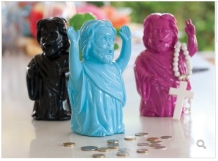
Christian television provides a revealing window into the church. Of course it has its fair share of charlatans, men (usually) offering a 70-fold blessing in return for your 'seed' gift, and promises of 'miracle money' for those who purchase 'miraculous spring water.' It also features an eclectic mix of other programming – from documentaries on Israel and the End Times, to long-running Christian drama serial 7th Street Theatre, which would surely be a cult classic if I wasn't its only fan. But it seems to me (from extensive and slightly compulsive research) that the majority of airtime on Christian TV channels is made up of 'ministry' broadcasts by large churches. Men standing on platforms, preaching to large crowds. And as I say, it's all very revealing.
The point and popularity of these broadcasts is understandable: they provide spiritual input from trained and trusted Bible teachers; they're well produced and often communicate some brilliant truth. They also communicate something else though: the dangerously high esteem in which these leaders are held by their followers.
For a start, the crowds are always adoring. From all the whooping, cheering and vigorous nodding as they speak, you'd think they were making some sort of perpetual Best Man's speech. Their word is taken as gospel; and while of course we should trust our leaders, we shouldn't get lazy about processing what they say. Then in the commercial breaks, we learn something else; almost all of these leaders are also accomplished authors, churning out a steady stream of self-help books. Some of them sing and release albums too; I haven't come across one who claims he can dance, but it's surely only a matter of a time.
There's more: these leaders are also regular speakers on the global conference circuit. One might imagine they're paid for doing so; one might also assume from anecdotal evidence that they don't travel in economy, but that's not the point. In doing so, they create even more content for Christian television, which broadcasts it complete with fundraising asks for both the ministry and the media, and the wheel turns again.
All of which might feel a bit grisly and unpleasant when put so starkly, but is it really a problem? A different view would argue that all these things are simply by-products of success; that if a leader grows a church to 20,000 people, he's going to attract media coverage, book deals and conference invites. So while my own perspective is not quite that generous, I don't want to focus on the big Christian leaders themselves, but their followers. Us.
We're cultivating monsters
Popular leaders only become so because of the people who attend their churches, buy their books and pay to hear them at conferences. If their egos swell (and from 15 years in Christian media I can safely report that they do), then we share some of the responsibility. Yes, James and Paul both dish out warnings to those who would wish to act as elders, to watch their conduct, but when Jesus addresses the subject of leaders, he takes the same warning to everyone.
In Matthew 23:8 Jesus says "but you are not to be called 'Rabbi', for you have one Teacher, and you are all brothers." And two verses later he restates the point: "Nor are you to be called instructors, for you have one Instructor, the Messiah." In other words, the church shouldn't elevate individuals into a place of lofty esteem, where they begin to act as a proxy or High Priest between the people and their God. Is Jesus suggesting that there shouldn't be any leaders in the church? Paul and the rest of the early church certainly don't seem to interpret him that way. But he is making a profound and provocative statement about the danger of idolising leaders.

It's a good thing to like and respect your church leader. And it's no bad thing to enjoy the preaching, writing, podcasts or TV broadcasts of 'big name' speakers and leaders who help you to understand the Bible and draw closer to God. The problem which Jesus is alluding to in Matthew 23 is one of replacement, or at least interruption, where our relationship with God becomes a triangle instead of a straight line. Leaders should always point us directly to Jesus, and never to themselves. But it's very difficult to attain that degree of submission and humility.
The very worst examples of Christian leadership have usually been enabled by the support of loyal followers. I once heard of a church which, when its disgraced pastor was released from prison, made every member of the congregation come to the front and swear allegiance to him over the 'lies' of the justice system. And part of the reason that the deeply flawed and abusive setup at Mars Hill Seattle was able to flourish for so long was the esteem in which the main leader was held, and the largely unaccountable way in which he was enabled to lead. Of course, in both situations, the chief antagonist is the main leader himself, but they only had power because of the army of passive henchmen behind them.
How do we cope when leaders fall?
If our faith in Jesus becomes intertwined with our love of a leader, then the consequences if that leader 'falls' can be catastrophic. When Christian leaders suffer some sort of moral failure, we inevitably hear about the people who've walked away from the faith as a result. And while our natural compulsion is to pour even more scorn on the leader for doing so, the fact that someone's faith in Jesus hinged on the behaviour of one of his followers is problematic. Of course, this is exactly why James writes that "we who teach will be judged more strictly"; he knows the catastrophic effects of hypocrisy on those who feel betrayed by it.
For our part though, we should try to ensure that we're not practising leader idolatry: placing a leader in that High Priest position that Jesus should rightly occupy. It's great to be encouraged and inspired by leaders, writers and speakers, but our everyday decision to follow Jesus should be rooted directly in him.
Who is really worth our devotion?
Let's be brutally honest: the problem with following Jesus is that he's invisible. That's why leader idolatry is so naturally compelling to us; we're drawn to physically present leaders who make sense of the world and help us to live a Christian life. Ultimately though, they're only men and women; fallible, imperfect, and as experience demonstrates time and again, corruptible.
The only person worthy of our total devotion is God himself. He might be invisible, but he's also entirely good, entirely trustworthy; completely infallible. That's easy to say, and just as easy to 'Amen' to; of course in practice it's not always quite that easy. Here though, is one useful check that can help us keep our priorities in the right order: let's not make idols of our leaders. Their job is to point us to Jesus, not to themselves. And we have a role to play in making that happen.
Martin Saunders is a Contributing Editor for Christian Today and the Deputy CEO of Youthscape. You can follow him on Twitter: @martinsaunders

















